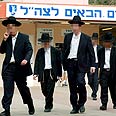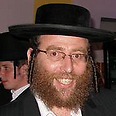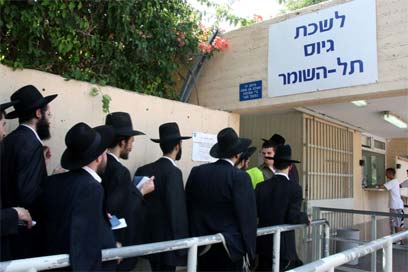

This means that a situation is created in which a haredi who enlists – whether he studied Torah in the past or not – becomes an exception to the rule.
Professor Menachem Friedman, an Emeritus Professor of sociology at Bar-Ilan University explains that "the moment a society of scholars was created, it led to the creation of a high ideal, and anyone who doesn't fit the ideal – something is wrong with them. Anyone who doesn't go to yeshiva must be an idiot because if he knows how to read – he should study.
"Meanwhile, there was a socio-cultural division between the haredi world and everything that is 'other' and the devotion to Torah became a defense mechanism against secular society. Thus creating a situation where it wasn't just the prodigies who…didn't enlist."
Professor Friedman claims that he had declared that the Tal Law would fail because it lacks "carrots" for those enlisting and also lacks "sticks'" for those who continue to avoid enlisting.
Friedman's solution: The State will continue to subsidize yeshivas but with supervision – "like in the university," with the goal of raising "scholarly leaders" in the Jewish nation. Their number will be limited, they will undergo exams in order to create competition and an equal opportunity.

'It's a joke that they want us in the army.' (Photo: Ofer Amram)
"Those left out (by the system) will still be able to study but will not receive exemption from civic duties. Meanwhile, the state will encourage the haredi population to carry out a meaningful civic service."
Rabbi Mordechai Baloi, Chairman of the Committee for Preserving Sanctity and Education explained the haredi norm to avoid IDF enlistment in two ways: A counter-response to the "licentious secular world" that exists outside of the yeshiva in general, and the lack of compatibility of the IDF to the needs of the haredi public.
In contrast to Friedman, Baloi, as a haredi educator, believes that the segregating social norms are not set to change due to the fact that the world is marching in a more and more liberal direction. That is why change will only come if the institutions outside of the yeshiva are made compatible with the haredi lifestyle, clearly not something on the IDF's horizon.
Baloi notes that the most problematic aspect of military service is that the IDF takes "ownership" of its soldiers and acts according to secular rules and commands, something which the haredi public cannot accept.
"If there is 'exclusion of women' as you call it, even in the army, a haredi soldier will simply ignore women. There is a chance that married haredim will be able to serve, but we have seen that it doesn't work. It's a joke that they want us in the army."















